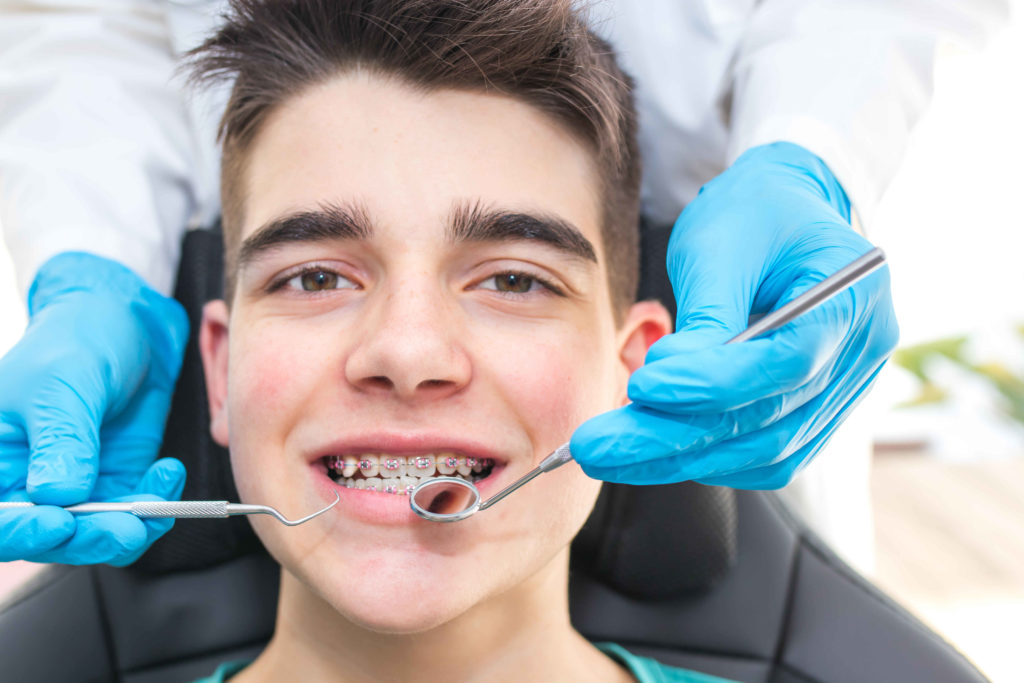Wondering what the difference is between a dentist and an orthodontist? Both practice dentistry and oral health. Doctors who study general dentistry are trained to prevent, diagnose and treat pathologies that affect the entire oral cavity. This involves the teeth, gums, tongue and inside of the mouth. Orthodontists also receive this generalist training, to which an additional qualification is added. They specialize in the detection and treatment of misaligned teeth and jaws. In this article, HELVIDENT explains the main differences between these two professions, so that you know which one to consult in case of need.
A dentist's mission
Like all doctors, the dentists in Switzerland are holders of a federal diploma which gives them the right to practice.
Dentists in Lausanne, Fribourg and elsewhere in Switzerland provide the following services:
- welcome patients and ask them about their symptoms
- perform a clinical examination
- oral health awareness
- advise on oral hygiene and prophylaxis
- treating dental caries
- repair broken, cracked or damaged teeth
- replace missing teeth with fixed (bridge, crown) or removable prostheses, either full or partial
- treat gum disease such as gingivitis
- prescribe treatments, medications and additional tests to treat oral pathologies
- perform professional dental bleaching
- take x-rays of the oral cavity and interpret the results
- perform minor surgical operations in the oral cavity (tooth extraction, periodontal procedures, artificial root implants, etc.).
- monitor children's dental development
- collaborate with other professionals in the dental practice (dental hygienist, maxillofacial surgeon, orthodontist, etc.)
The missions of an orthodontist
Visit Swiss Society of Dentists SSO explains that there are 4 curricula leading to federally recognized specialist titles. Orthodontics is one of them, along with periodontology, oral surgery and reconstructive dentistry.
The main difference between a dentist and an orthodontist therefore lies in whether or not they follow an additional specialization. In other words, an orthodontist in Lausanne is a dental practitioner specializing in orthodontics.
Here are the activities that orthodontists carry out on a daily basis:
- perform a dental check-up
- monitor children's dentofacial development to prevent any abnormalities
- diagnose abnormalities in tooth and jaw position (overlapping or spaced teeth, jaw irregularities, etc.).
- detailed documentation (X-rays, plaster casts, front and side photographs of teeth and jaws)
- draw up a treatment plan taking into account aesthetic and functional aspects
- design straightening or corrective appliances adapted to each patient
- install and adjust these fixed or removable devices
- perform surgical procedures (tooth extraction)
- collaborate with a maxillo-facial surgeon for certain operations
Orthodontist vs. dentist: training and qualifications
Dentists and orthodontists receive the same generalist training. They both hold a federal diploma in dentistry.
They follow a common curriculum at Swiss medical faculties. Admission requirements are based on a "maturité gymnasiale" or equivalent qualification. It takes 6 semesters to obtain a Bachelor's degree, and a further 4 semesters to obtain a Master's degree.
- Bachelor cycle: basic sciences, basic medical sciences, propaedeutic and clinical dentistry
- Master cycle: clinical experience, medical-dental activity, daily clinical activity
The qualification obtained is a university master's degree in dentistry, which entitles the holder to sit the examination for the federal diploma in dentistry. After graduation, most dentists work as assistants before opening their own dental practices in Fribourg, Lausanne or another commune.
That said, dentists can also consider further training in a particular field. This is the case for orthodontists who enrol in the Master of advanced studies (MAS) in orthodontics in Geneva. This further training course lasts 4 years and involves employment.
For more information, visit official Swiss information portal for vocational, academic and career guidance.
The difference between a dentist and an orthodontist: who to consult?
To keep things simple, your dentist is a general practitioner and your orthodontist is a specialist. As a result, the majority of common oral problems can be treated by a dentist. This applies in particular to cavities, toothaches, tooth extractions, toothaches and other dental problems. bleeding gumsoral infections and inflammations. You can also consult a dentist for a dental emergency in Lausanne or Fribourg.
If your dentist deems it necessary, he or she will refer you to a fellow orthodontist for specialized treatment. Malocclusion, excess space between teeth, dental traumaThe presence of an extra tooth is also a reason for consulting an orthodontist in Fribourg.
In addition, every child should consult an orthodontist before the age of 7. Thumb-sucking and tongue thrusting can cause problems. The specialist will detect any abnormalities in time to prevent them from worsening in adulthood.
HELVIDENT: dental practices in Lausanne, Fribourg and Aigle
Do you need dental care? HELVIDENT welcomes you to one of our three dental clinics in Fribourg, Lausanne and Aigle. Our team includes dentists, dental hygienists, orthodontists and specialists in implantology, periodontics and endodontics. Contact us to quickly book an appointment.

